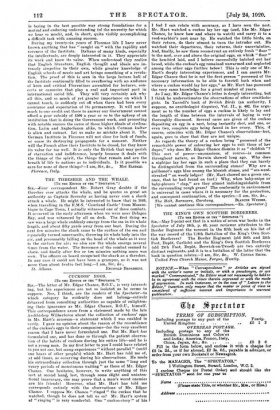CUCKOOS' EGGS.
[To THE EDITOR OF THE "SPECTATOR.") SIR,—The letter of Mr. Edgar Chance, B.0.11., is very interest- ing, but his experiences are not so isolated as he seems to suppose. Nor, I think, are the readers of the Spectator—to which category he evidently does not belongr-entirely debarred from consulting authorities as capable of enlighten- ing their ignorance as Mr. Edgar Chance, B.O.U., himself. This correspondence arose from a statement made by the late Archbishop Wilberforce about the collection of cuckoos' eggs in Mr. Hart's museum—a statement which I was enabled to verify. I gave no opinion about the reason of the resemblance of the cuckoo's eggs to their companions—for the very excellent reason that I have never formulated one. But Mr. Hart has formulated one, and has done so through the patient observa- tion of the habits of cuckoos during his entire life—and he is not a young man. In my first letter to you I could have related to you not one, but many experiences "without parallel" (until . one hears of other people's) which Mr. Hart has -told me of, at odd times, as occurring during his observations. He made his extraordinary collection through just the same "long and weary periods of monotonous waiting" as those of Mr. Edgar Chance. One hesitates, however, to write anything of this sort at second hand/ lest, through some slight and uninten- tional inaccuracy, one may prove that a man's worst enemies are his friends! However, what Mr. Hart has told me corresponds entirely with the observations of Mr. Edgar Chance. I suppose Mr. Chance " ringed " the cuckoo that he watched, though he does not tell us so? Mr. Hart's system of " ringing" is very wonderful. One " cuckoo-story " of his I feel I can relate with accuracy, as I have seen the nest. Mr. Hart watched a cuckoo lay her egg (and, like Mr. Edgar Chance, he knew how and where to watch) and carry it to a reed-warbler's nest near by. He watched the little birds, on their return, do their utmost to ;turn the intruder out. He watched their departures, their returns, their uncertainties. And, finally, he saw them reconstruct an entirely fresh " floor " to the nest, over and above the original eggs, on which " floor " the hen-bird laid, and I believe successfully hatched out her brood, while the cuckoo's egg remained unwarmed and neglected among the other eggs further below! This is only one of Mr. Hart's deeply interesting experiences, and I can assure Mr. Edgar Chance that he is not the first person "possessed of the necessary information to be able to foretell both when and where a cuckoo would lay her eggs," as Mr. Hart has possessed the very same knowledge for a great number of years.
As I say, Mr. Edgar Chance's letter is deeply interesting, but I think he underestimates the observations of other ornitholo- gists. In Yarrell's book of British Birds (an authority, I suppose, no ornithologist disputes), Vol. II., p. 402, the argu- ment as to the number of eggs a cuckoo is likely to lay and the length of time between the intervals of laying is very thoroughly discussed. Several cases are given of the cuckoo depositing an egg in a nest, being instantly shot, and one, or even two, complete eggs being found in her ovary. This, course, coincides with Mr. Edgar Chance's observations—but, again, goes to show that they are not unique.
As regards the theory of a cuckoo being "possessed of the remarkable power of colouring her eggs to suit those of her dupes," why does Mr. Edgar Chance dismiss it as "childish "? This sort of power—unconscious, of course—is common throughout nature, as Darwin showed long ago. Why does a nightjar lay her eggs in such a place that they can barely be distinguished from the surrounding stones? Why are a guillemot's eggs blue among the blueish stones, and " sea-weed- streaked " on weedy ledges? (Mr. Hart showed me a green one, once, that he had found on turf.) Why, when baby-snipe or. baby-plovers "clap," are they almost indistinguishable from the surrounding rough grass? The conformity to environment is universal in eases where it is necessary for the protection, and consequent continuation, of the species.—I am, Sir, &c., The Holt, Barnacre, Garstang. BLANCHE WINDER. tWe cannot continue this correspondence.—Ea. Spectator.]


































 Previous page
Previous page